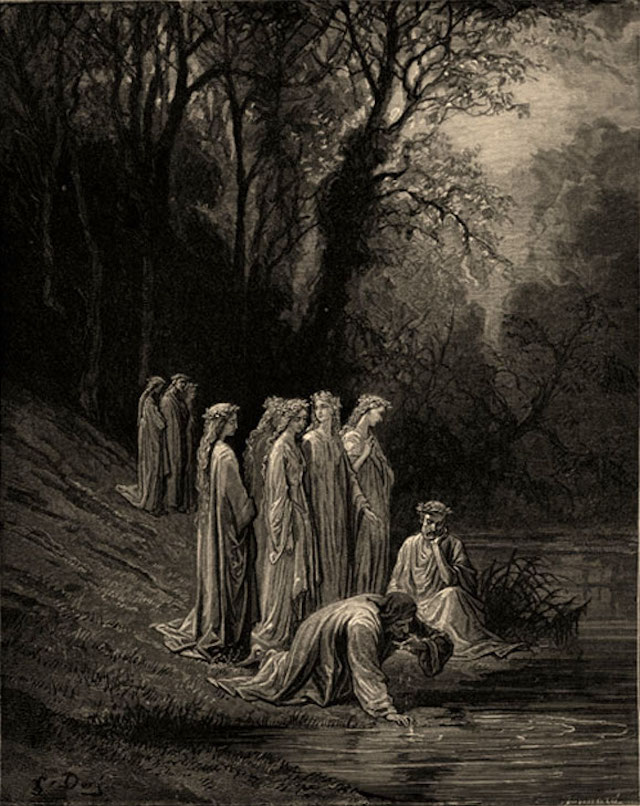After the full restoration of soul and relationship – and understanding God’s Grace in the process – there is one last stop in Eden, with the River of Eunoe.
The Greek Tradition had five rivers, and Dante here invents a sixth river from the words “well” (eu-) and “nous”, a “well/good mind”, as the purpose of the river.
While often thought of as the river to “restore the memories of the Good” or of “the Good deeds”, there is also likely a much deeper function, drawing on St. Aquinas and older Catholic theology: the soul deep inside has memories of its own origins, and roots, in God. So in a way, this final scene could also imply that the final “touch” of preparation for the ascent to Heaven, is to connect your soul with its deepest roots in existence, reality, the breath and image of God, within its very origins.
This might also be why Matelda provides this function here, as the transformed earthly life that is transparent for Divine realities. She has the capacity to lead or assist in this process or threshold for the soul, to have its first experience of again sensing or “remembering” its origins. Which would in a larger way complete Eden with not only the soul and the relationship, but also its memory of connection.
When Matelda gently tells Stazio to go with the Pilgrim, this likely suggests that this new remembrance of origins, is a step that every soul will go through as completing the Purgatorio. The task is complete. And the Heavens await, in the stars.


Amen! I’ve always taught Eunoe not as simply memories of the good, but a right perspective on one’s entire life, good and bad together. It’s obvious that the poet (who having completed the vision, and is back in Italy recording his memories) remembers his sin. So, while Lethe removes the memory and guilt completely, Eunoe restores the memory (but not the guilt). And the restoration of the memory of sin becomes of central importance in understanding the nature of grace. So when the pilgrim leaves Eden, he has the perspective of Rom 8:28 — God works all things together for the good of those who love Him and are called according to HIs purpose. All things here including the pilgrim’s rebellion.
This is what allows the poet to be so ruthless with his depiction of the pilgrim in Inferno. It all works together, even being lost in a dark wood.
Exactly! It all comes together – the sin, the mistakes, the understanding, and also the redemption through Grace.
And this is one of the most genius culminations by Dante I think, reaching the right perspective on everything – the “Good Nous”, the heart, mind, intellect, apprehension. And being ruthless about the Pilgrim in Inferno thus works in service of this higher goal – of understanding sin, how to repair, and finally how to reach the “state” of Eunoe!